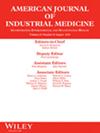COVID-19 deaths in dental occupations and other healthcare occupations among U.S. decedents in 2020
Abstract
Background
Early studies during the COVID-19 pandemic suggested dental occupations were among the highest risk for exposure to SARs-CoV-2 because of multiple factors increasing exposure, including close proximity to unmasked patients and performance of aerosol-generating procedures. However, to date, few studies have investigated COVID-19 deaths in United States dental occupations, and compared COVID-19 deaths among healthcare occupations.
Methods
We analyzed 2020 mortality data collected by the National Center for Health Statistics' National Vital Statistics System. Multivariable logistic regression was used to generate odds ratios (ORs) and 95% confidence intervals for COVID-19 as the underlying cause of death in relation to occupation in working-age decedents (≤65 years), after adjusting for age, sex, race/ethnicity, education, and medical conditions associated with severe COVID-19.
Results
Dental occupations did not have significantly higher risk for COVID-19 death when compared to all other occupations combined. Among healthcare occupations with frequent, direct patient- or client interactions, LPNs and LVNs, and speech and language pathologists had significantly elevated adjusted ORs for COVID-19 death when compared to dentists, dental hygienists, or dental assistants. Similarly, nurse practitioners had significantly higher ORs for COVID-19 mortality than dentists or dental hygienists, and approached significance when compared to dental assistants. Conversely, massage therapists and other health diagnosing and treating practitioners had significantly lower adjusted ORs for COVID-19 death compared with dental occupations.
Conclusion
Our study highlights potential differences in work-related transmission of SARs-CoV-2 and subsequent COVID-19 deaths in healthcare occupations, and furthers a previously limited understanding of COVID-19 deaths in healthcare occupations in 2020, before COVID-19 vaccine availability. Our results indicate that dental occupations were not among the highest, nor lowest risk, healthcare occupations for COVID-19 deaths in 2020, despite their known risks of direct exposure.

 求助内容:
求助内容: 应助结果提醒方式:
应助结果提醒方式:


